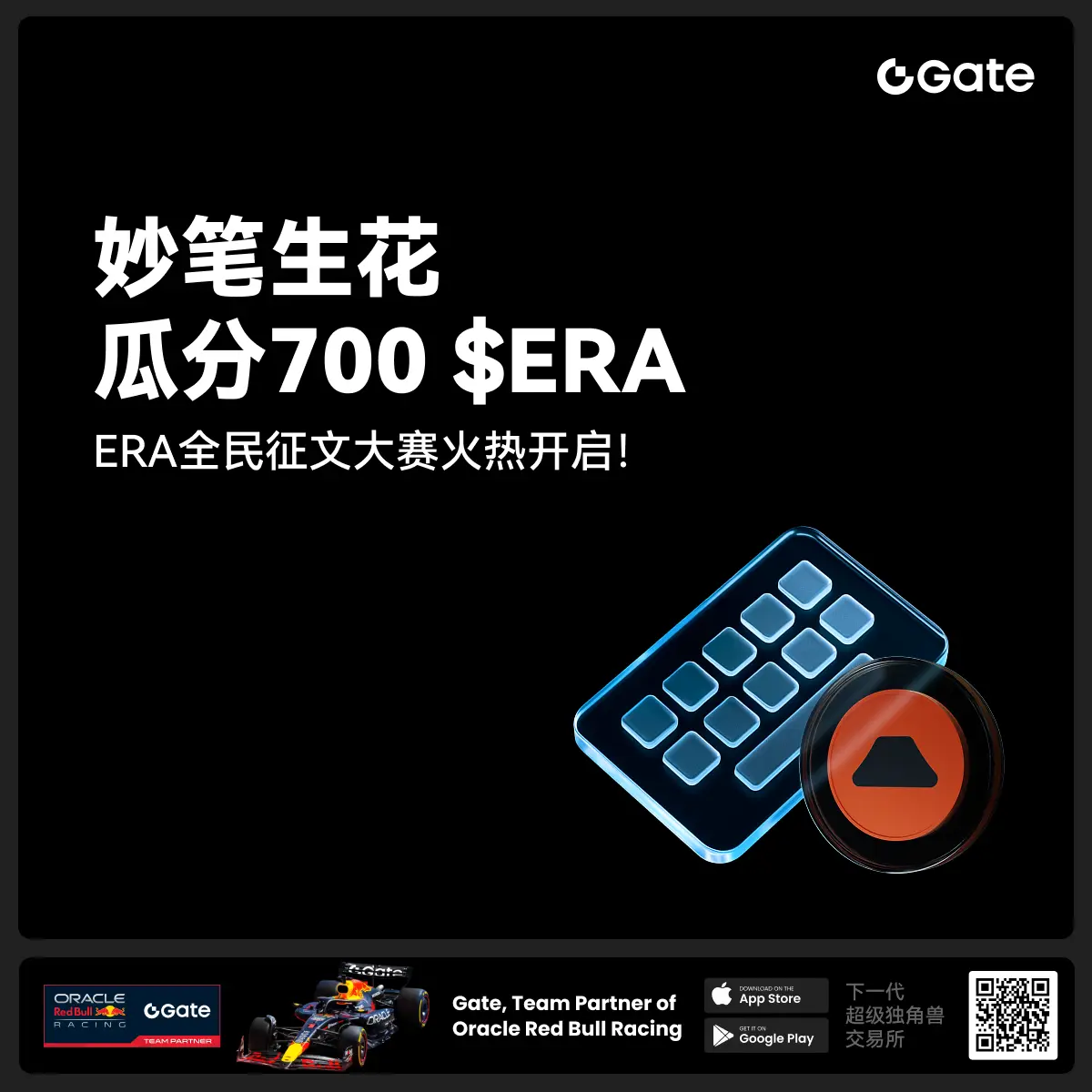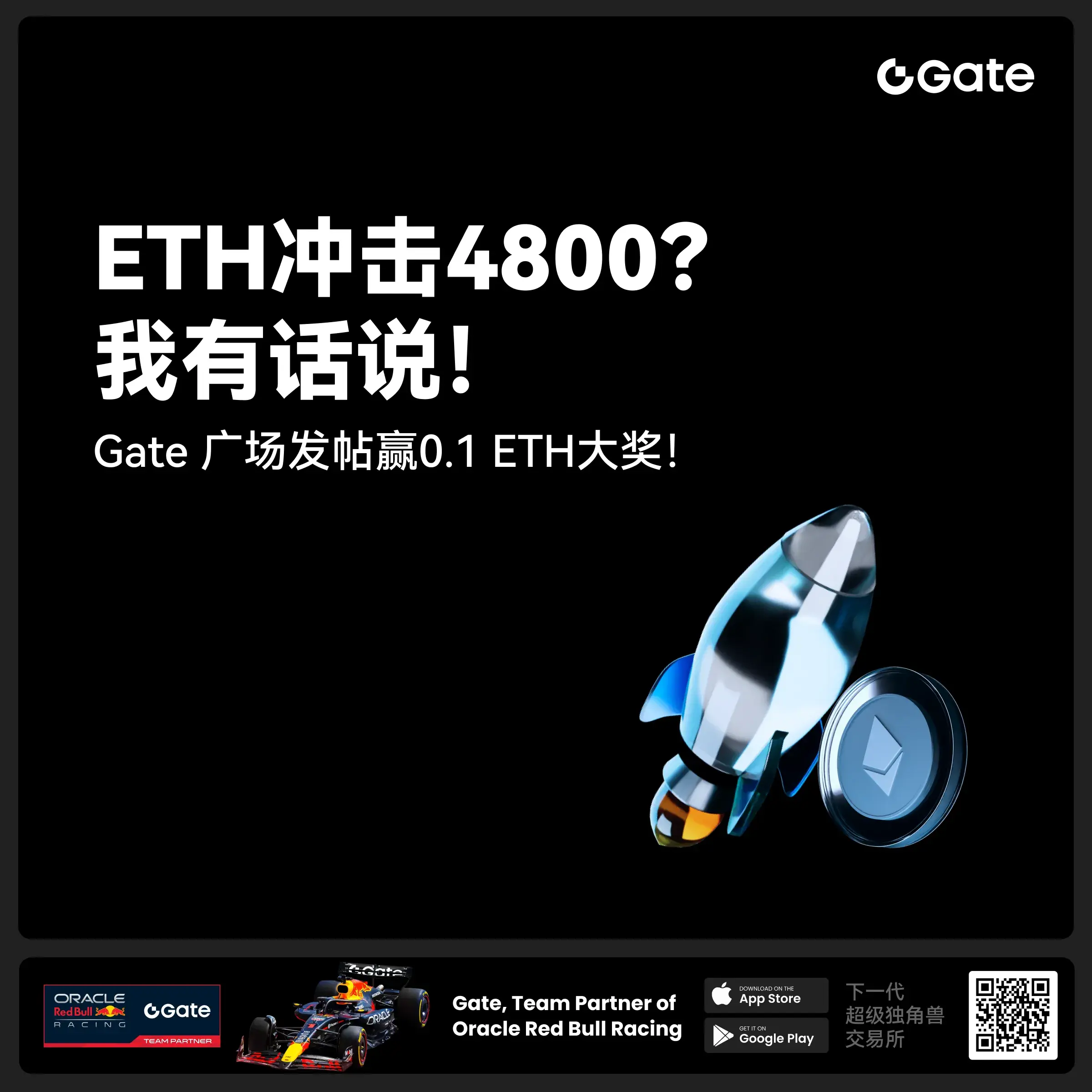更多
- 話題1/3
17348 熱度
9628 熱度
17274 熱度
6768 熱度
1988 熱度
- 置頂
- 🎉Gate 2025 上半年社區盛典:內容達人評選投票火熱進行中 🎉
🏆 誰將成爲前十位 #Gate广场# 內容達人?
投票現已開啓,選出你的心頭好
🎁贏取 iPhone 16 Pro Max、限量週邊等好禮!
📅投票截止:8 月 15 日 10:00(UTC+8)
立即投票: https://www.gate.com/activities/community-vote
活動詳情: https://www.gate.com/announcements/article/45974
- 📢 #Gate广场征文活动第二期# 正式啓動!
分享你對 $ERA 項目的獨特觀點,推廣ERA上線活動, 700 $ERA 等你來贏!
💰 獎勵:
一等獎(1名): 100枚 $ERA
二等獎(5名): 每人 60 枚 $ERA
三等獎(10名): 每人 30 枚 $ERA
👉 參與方式:
1.在 Gate廣場發布你對 ERA 項目的獨到見解貼文
2.在貼文中添加標籤: #Gate广场征文活动第二期# ,貼文字數不低於300字
3.將你的文章或觀點同步到X,加上標籤:Gate Square 和 ERA
4.徵文內容涵蓋但不限於以下創作方向:
ERA 項目亮點:作爲區塊鏈基礎設施公司,ERA 擁有哪些核心優勢?
ERA 代幣經濟模型:如何保障代幣的長期價值及生態可持續發展?
參與並推廣 Gate x Caldera (ERA) 生態周活動。點擊查看活動詳情:https://www.gate.com/announcements/article/46169。
歡迎圍繞上述主題,或從其他獨特視角提出您的見解與建議。
⚠️ 活動要求:
原創內容,至少 300 字, 重復或抄襲內容將被淘汰。
不得使用 #Gate广场征文活动第二期# 和 #ERA# 以外的任何標籤。
每篇文章必須獲得 至少3個互動,否則無法獲得獎勵
鼓勵圖文並茂、深度分析,觀點獨到。
⏰ 活動時間:2025年7月20日 17
- 📢 ETH衝擊4800?我有話說!快來“Gate廣場”秀操作,0.1 ETH大獎等你拿!
牛市預言家,可能下一個就是你!想讓你的觀點成爲廣場熱搜、贏下ETH大獎?現在就是機會!
💰️ 廣場5位優質發帖用戶+X瀏覽量前5發帖用戶,瓜分0.1 ETH!
🎮 活動怎麼玩,0門檻瓜分ETH!
1.話題不服來辯!
帶 #ETH冲击4800# 和 #ETH# 在 廣場 或 K線ETH下 圍繞一下主題展開討論:
-ETH是否有望突破4800?
-你看好ETH的原因是什麼?
-你的ETH持倉策略是?
-ETH能否引領下一輪牛市?
2. X平台同步嗨
在X平台發帖討論,記得帶 #GateSquare# 和 #ETH冲击4800# 標籤!
把你X返連結提交以下表單以瓜分大獎:https://www.gate.com/questionnaire/6896
✨發帖要求:
-內容須原創,字數不少於100字,且帶活動指定標籤
-配圖、行情截圖、分析看法加分,圖文並茂更易精選
-禁止AI寫手和灌水刷屏,一旦發現取消獎勵資格
-觀點鮮明、邏輯清晰,越有料越好!
關注ETH風向,創造觀點價值,從廣場發帖開始!下一個牛市“預言家”,可能就是你!🦾🏆
⏰ 活動時間:2025年7月18日 16:00 - 2025年7月28日 23:59(UTC+8)
【立即發帖】 展現你的真知灼見,贏取屬於你的ETH大獎!
- 🎉 #Gate Alpha 第三届积分狂欢节 & ES Launchpool# 聯合推廣任務上線!
本次活動總獎池:1,250 枚 ES
任務目標:推廣 Eclipse($ES)Launchpool 和 Alpha 第11期 $ES 專場
📄 詳情參考:
Launchpool 公告:https://www.gate.com/zh/announcements/article/46134
Alpha 第11期公告:https://www.gate.com/zh/announcements/article/46137
🧩【任務內容】
請圍繞 Launchpool 和 Alpha 第11期 活動進行內容創作,並曬出參與截圖。
📸【參與方式】
1️⃣ 帶上Tag #Gate Alpha 第三届积分狂欢节 & ES Launchpool# 發帖
2️⃣ 曬出以下任一截圖:
Launchpool 質押截圖(BTC / ETH / ES)
Alpha 交易頁面截圖(交易 ES)
3️⃣ 發布圖文內容,可參考以下方向(≥60字):
簡介 ES/Eclipse 項目亮點、代幣機制等基本信息
分享你對 ES 項目的觀點、前景判斷、挖礦體驗等
分析 Launchpool 挖礦 或 Alpha 積分玩法的策略和收益對比
🎁【獎勵說明】
評選內容質量最優的 10 位 Launchpool/Gate - 🎉【Gate 3000萬紀念】曬出我的Gate時刻,解鎖限量好禮!
Gate用戶突破3000萬!這不僅是數字,更是我們共同的故事。
還記得第一次開通帳號的激動,搶購成功的喜悅,或陪伴你的Gate週邊嗎?
📸 參與 #我的Gate时刻# ,在Gate廣場曬出你的故事,一起見證下一個3000萬!
✅ 參與方式:
1️⃣ 帶話題 #我的Gate时刻# ,發布包含Gate元素的照片或視頻
2️⃣ 搭配你的Gate故事、祝福或感言更佳
3️⃣ 分享至Twitter(X)可參與瀏覽量前10額外獎勵
推特回鏈請填表單:https://www.gate.com/questionnaire/6872
🎁 獨家獎勵:
🏆 創意大獎(3名):Gate × F1紅牛聯名賽車模型一輛
👕 共創紀念獎(10名): 國際米蘭同款球員衛衣
🥇 參與獎(50名):Gate 品牌抱枕
📣 分享獎(10名):Twitter前10瀏覽量,送Gate × 國米小夜燈!
*海外用戶紅牛聯名賽車折合爲 $200 合約體驗券,國米同款球衣折合爲 $50 合約體驗券,國米小夜燈折合爲 $30 合約體驗券,品牌抱枕折合爲 $20 合約體驗券發放
🧠 創意提示:不限元素內容風格,曬圖帶有如Gate logo、Gate色彩、週邊產品、GT圖案、活動紀念品、活動現場圖等均可參與!
活動截止於7月25日 24:00 UTC+8
3
全球加密監管格局:各國政策與機遇分析
加密監管世界地圖:政策寬松進行時
近年來,隨着加密市場日益受到關注,對其監管的需求也愈發迫切。各國基於自身經濟、金融體系與戰略考量,紛紛出臺特色鮮明的監管政策。從美國監管機構與加密企業的持續博弈,到歐盟全面鋪開的MiCA法案,再到新興經濟體在創新與風險間的權衡,全球加密監管格局呈現出前所未有的復雜性與多樣性。讓我們展開加密監管世界地圖,探尋這場全球監管浪潮下的隱祕脈絡。
在本文中,我們將各個國家分爲四類:業務聚集區、完全合規、部分合規和不合規。判斷標準包括加密資產的法律地位(50%)、監管框架與法案落地情況(30%)和交易所落地情況(20%)。
亞洲
大中華區
中國香港
在香港,加密資產被視爲"虛擬資產",而非貨幣,受證券及期貨事務監察委員會(SFC)監管。對穩定幣實行牌照制度,《穩定幣條例》限制持牌機構發行港元穩定幣。NFT被視爲虛擬資產;治理代幣按"集體投資計劃"規則監管。
2023年修訂《打擊洗錢條例》,要求加密貨幣交易所獲得牌照。SFC發布虛擬資產ETF規則,負責牌照發放。目前HashKey和OSL首批獲得牌照,超過20家機構正在申請中。持牌交易所可服務散戶。比特幣和以太坊ETF已於2024年在香港上市。
香港通過積極擁抱Web3和虛擬資產,特別是允許散戶交易和推出虛擬資產ETF,旨在鞏固其國際金融中心地位。這與中國大陸的嚴格禁令形成鮮明對比,香港選擇了一條截然不同的道路,積極構建清晰、受監管的虛擬資產市場。允許散戶參與和推出ETF,是其吸引全球加密資本和人才、提升市場流動性和國際競爭力的關鍵舉措。
中國臺灣
中國臺灣地區對加密貨幣持謹慎態度,不承認其貨幣地位,但對其作爲投機性數字商品進行監管,並逐步完善反洗錢和證券型代幣發行(STO)的框架。
目前不承認加密貨幣爲貨幣,自2013年以來,臺灣中央銀行和金融監督管理委員會(FSC)的立場是,比特幣不應被視爲貨幣,而是一種"高度投機的數字虛擬商品"。NFT和治理代幣的法律地位尚未明確,但在實踐中,NFT交易需申報利得稅。證券型代幣被FSC認定爲證券,受《證券交易法》監管。
《洗錢防制法》對虛擬資產進行規範。FSA已下令,自2014年起本地銀行不得接受比特幣,也不得提供任何相關服務。對於STO,臺灣有特定規定,根據發行金額區分監管路徑。FSC還於2025年3月宣布起草針對虛擬資產服務提供商(VASP)的法律,旨在從基本註冊框架轉向全面的許可制度。
FSC在2024年根據《洗錢防制法》引入新規,要求VASP在提供任何虛擬資產相關服務之前向FSC註冊。未註冊可能面臨刑事處罰。對於STO,發行人必須是臺灣註冊的股份有限公司,且STO平台運營商需獲得證券商牌照,並具備至少1億新臺幣的實收資本。
中國大陸
中國大陸全面禁止加密資產的交易和所有相關金融活動。中國人民銀行認爲加密貨幣擾亂金融系統,並爲洗錢、詐騙、傳銷、賭博等犯罪活動提供了便利。
在司法實踐上,虛擬貨幣具有相應的財產屬性,在司法實踐中已基本形成共識。民事領域判例普遍認爲虛擬貨幣在佔有上具有排他性、可控性與流通性等特點,與虛擬商品類似,承認虛擬貨幣具有財產屬性。部分判例援引民法典第一百二十七條"法律對數據、網路虛擬財產的保護有規定的,依照其規定"、參考《全國法院金融審判工作會議紀要》第83條"虛擬貨幣具備網路虛擬財產的部分屬性",認定虛擬貨幣是一種特定虛擬財產,應當受法律保護。在刑事領域,近期最高人民法院案例庫入庫案例也已明確虛擬貨幣屬於刑法意義上的財物,具有刑法意義上的財產屬性。
但自2013年起,中國大陸的銀行被禁止從事加密貨幣業務。2017年9月,中國決定在限定時間內陸續關閉境內所有虛擬貨幣交易所。2021年9月,中國人民銀行發布通知,全面禁止與虛擬貨幣結算和提供交易者信息有關的服務,並明確從事非法金融活動將追究刑事責任。此外,加密貨幣礦場也被關閉,並且不允許開設新的礦場。境外虛擬貨幣交易所通過互聯網向中國境內居民提供服務也被視爲非法金融活動。
新加坡
新加坡將加密資產視爲"支付工具/商品",這主要依據其《支付服務法案》的規定。對於穩定幣,實行持牌發行制度,新加坡金融管理局(MAS)要求發行方必須具備1:1的儲備,並進行月度審計。對於其他代幣,如NFT和治理代幣,採取個案判定原則:NFT通常不被視爲證券,而治理代幣如果帶有分紅權,則可能被視爲證券。
2022年頒布的《金融服務和市場法》對交易所和穩定幣進行監管。然而,近期生效的DTSP新規大幅縮減了牌照合規範圍,這可能影響到加密項目和交易所的離岸業務。MAS通常爲加密企業頒發三類牌照:貨幣兌換、標準支付和大型支付機構,目前已有超過20家機構獲得牌照,其中包括Coinbase。許多國際交易所選擇在新加坡設立區域總部,但這些機構將受到DTSP新規的影響。
韓國
在韓國,加密資產被視爲"合法資產",但並非法定貨幣,這主要依據《特定金融信息報告與利用法》(《特金法》)的規定。目前,《數字資產基本法》(DABA)草案正在積極推進中,有望爲加密資產提供更全面的法律框架。現行的《特金法》主要側重於反洗錢監管。對於穩定幣,DABA草案擬要求其儲備透明化。而對於其他代幣,如NFT和治理代幣,其法律地位尚未明確:NFT目前暫按虛擬資產監管,治理代幣則可能被納入證券範疇。
韓國實行實名制交易所許可制度,目前已有Upbit、Bithumb等5家主要交易所獲得牌照。在交易所落地方面,韓國市場主要由本土交易所主導,並且禁止外國交易所直接服務韓國居民。同時,韓國《數字資產基本法》(DABA)草案正在推進中,擬要求穩定幣儲備透明化。這種策略既保護了本土金融機構和市場份額,也便於監管機構對境內交易活動進行有效監控。
印度尼西亞
印度尼西亞正在經歷加密資產監管權從商品期貨交易監管局(Bappebti)轉移至金融服務管理局(OJK)的變化,預示着更全面的金融監管。
加密資產的法律地位尚未明確。隨着近期監管權的轉移,加密資產被歸類爲"數字金融資產"。
此前,印尼《商品法》對交易所進行監管。然而,近期頒布的《2024年第27號OJK條例》(POJK 27/2024)將加密資產交易的監管權從Bappebti轉移至OJK,該法規將於2025年1月10日生效。這一新框架爲數字資產交易所、清算機構、托管方和交易商設定了嚴格的資本金、所有權和治理要求。所有先前由Bappebti頒發的許可證、批準和產品註冊在不與現行法律法規衝突的情況下仍然有效。
牌照發放機構已從Bappebti轉移至OJK。加密資產交易商的最低實收資本爲1000億印尼盾,並需保持至少500億印尼盾的股本。用於實收資本的資金不得來源於洗錢、恐怖主義融資或大規模殺傷性武器融資等非法活動。所有數字金融資產交易提供商必須在2025年7月前完全遵守POJK 27/2024的新義務和要求。
本土交易所如Indodax在當地活躍運營。Indodax是一家受監管的中心化交易所,提供現貨、衍生品和場外交易(OTC)服務,並要求用戶進行KYC合規。
泰國
泰國正在積極塑造其加密貨幣市場,通過稅收優惠和嚴格的牌照制度,鼓勵合規交易並鞏固其作爲全球金融中心的地位。
在泰國,擁有、交易和挖礦加密貨幣是完全合法的,並且利潤需按照泰國法律納稅。
泰國已制定《數字資產法》。值得注意的是,泰國已批準對通過持牌加密資產服務提供商進行的加密貨幣銷售收入免徵五年資本利得稅,該政策將從2025年1月1日持續至2029年12月31日。這項措施旨在將泰國定位爲全球金融中心,並鼓勵居民在受監管的交易所進行交易。泰國證券交易委員會(SEC)負責監管加密市場。
泰國SEC負責發放牌照。交易所必須獲得官方許可,並需註冊爲泰國有限或公衆有限公司。牌照要求包括最低資本金(中心化交易所5000萬泰銖,去中心化交易所1000萬泰銖)以及董事、高管和主要股東需滿足"適當人選"標準。
本土交易所如Bitkub在當地活躍,並擁有泰國最高的加密貨幣交易量。其他主要的持牌交易所包括Orbix、Upbit Thailand、Gulf Binance和KuCoin TH。泰國SEC已對Bybit、OKX等五家全球加密交易所採取措施,阻止其在泰國運營,原因是它們未獲得本地牌照。Tether也已在泰國推出了其代幣化黃金數字資產。
日本
日本是全球最早明確承認加密貨幣法律地位的國家之一,其監管框架成熟且審慎。
在《支付服務法》中,加密資產被承認爲"合法支付手段"。對於穩定幣,日本實行嚴格的銀行/信托專營制度,要求其必須掛鉤日元且可贖回,同時明確禁止算法穩定幣。至於其他代幣,如NFT,它們被視爲數字商品;而治理代幣則可能被認定爲"集合投資計劃權益"。
日本通過修訂《支付服務法》和《金融工具交易法》(2020年),正式承認加密資產爲合法支付手段。金融廳(FSA)負責監管加密市場。修訂後的《支付服務法》還增加了"國內持有令"條款,允許政府在必要時要求平台將部分用戶資產保留在日本境內,以防止資產外流風險。在牌照發放上,FSA負責頒發交易所牌照,目前已有45家持牌機構。獲得日本加密貨幣牌照的關鍵要求包括:在當地設有法律實體和辦公室、滿足最低資本金要求(超過1000萬日元,並有具體資金持有規定)、遵守AML和KYC規則、提交詳細的商業計劃以及進行持續的報告和審計。
日本市場主要由Bitflyer等本土交易所主導。國際平台若要進入日本市場,通常需要通過合資方式(如Coincheck)。
歐洲
歐盟
作爲現今全球加密領域中司法監管較爲完善和